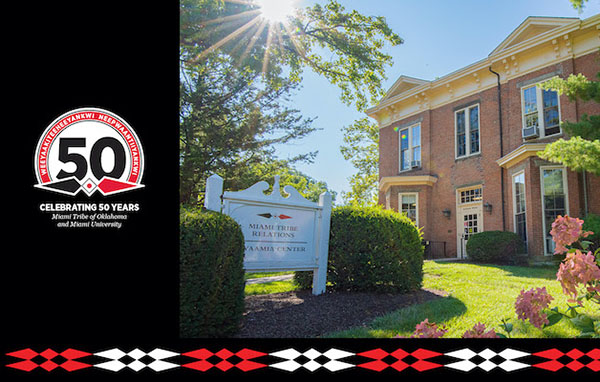Myaamiaki Conference to highlight Myaamia language and culture revitalization
There is a shared commitment to neepwaantiinki, the Myaamia word for “learning from each other.”

Myaamiaki Conference to highlight Myaamia language and culture revitalization
By Margo Kissell, University Communications and Marketing
This year, the Miami Tribe of Oklahoma and Miami University are celebrating their 50-year relationship, with a focus on the shared commitment to neepwaantiinki, the Myaamia word for “learning from each other.”
The Myaamia Center — the Tribe’s research arm located in Bonham House on the university’s Oxford campus — will hold its ninth biennial conference at the Armstrong Student Center from 9 a.m. to 4 p.m. on Saturday, April 9.
Myaamia Center leaders will share — through a hybrid in-person and virtual format — ongoing activities that support the revitalization of Myaamia language and culture.
The conference is free and open to the public. View the detailed schedule; all participants are encouraged to register.
Kara Strass, director of the Miami Tribe Relations office, and Cameron Shriver, Myaamia Research associate and visiting assistant professor in the Department of History, will explore the history of this unique relationship — from the university’s founding in 1809 to present day.
They will discuss outcomes of the relationship, including the Myaamia Center and the Myaamia Heritage Award Program. Created in 1991, the program provides a tuition waiver and a four-year undergraduate college experience for Miami Tribe students.
“We always look forward to the Myaamiaki Conference because it is our best opportunity to share our ongoing work with the Myaamia community, the Miami University community, and our outside partners,” Strass said. “This year is even more special because of the connection to the 50th anniversary celebrations.”
Relationship plays key role in revitalization
Myaamia Center Executive Director Daryl Baldwin has credited the relationship between the two Miamis — the sovereign Tribal Nation and public university — with playing a key role in the language and cultural awakening.
His tribal ancestors’ Myaamia language had all but vanished after the Miami Tribe was forced from its homelands, including what is now Ohio, Indiana, and Illinois.
Being able to carve out a space at Miami to reposition itself and heal from the past was a critical step, Baldwin has said.
Today, there is much to celebrate:
- 100 Tribe students have earned degrees from the university.
- The university had its largest incoming class of Tribe students in the fall: 13.
- More Tribe students are on campus at one time than ever before: 38.
- Miami Tribe students have achieved a 92% six-year graduation rate compared to a 39% national average for Native Americans.
Baldwin said the Myaamia Center will celebrate the unique relationship with various activities throughout the year.
“One important aspect of this unique relationship is the Tribally directed work we all carry out through the Myaamia Center,” he said. “We are a unique, interdisciplinary team that is passionate about the preservation and revitalization of our Myaamia language and culture for the benefit of the Tribal Nation present and future.”
The conference will highlight various projects that are underway in the Myaamia Center.
‘We’ve been holding our conference since 2008 and, since that time, there has been a tremendous amount of progress and growth towards supporting the revitalization goals of the Miami Tribe,” Baldwin said.
With its recent $2 million contribution to the Myaamia Center’s endowment, the Miami Tribe of Oklahoma is helping to ensure the continued growth and expansion of the center.
Upcoming webinar series
The Myaamia Center will host the Webinar Series: History of Miami Tribe and Miami University from noon to 1 p.m. Wednesday, June 1.
How did a tribe and a university come to build a fruitful relationship? Now celebrated as a unique and positive partnership spanning 50 years, the story behind the relationship between the Miami Tribe of Oklahoma and Miami University is both fascinating and critical to the histories of both partners.
Here’s an updated schedule showing several other Myaamia Center webinars this year.